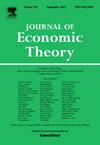模糊实验的信息量排序
IF 1.2
3区 经济学
Q3 ECONOMICS
引用次数: 0
摘要
我们将布莱克韦尔的信息性顺序推广到模糊实验中。如果决策者对统计实验信号的数据生成过程存在不确定性,那么她可能会将该实验视为模糊实验。形式上,模糊实验被建模为从辅助状态空间到非模糊实验集合的映射。每个辅助状态对应一个可能的数据生成过程。我们证明,在每个决策问题中,每个决策者都会优先选择一个模糊实验而不是另一个模糊实验,当且仅当它们之间存在一种叫做 "先验支配"(prior-by-prior dominance)的关联条件时。"先验支配 "条件指出,对于决策者在辅助状态空间上的任何一阶信念,第一个实验的这种信念所产生的预期实验比第二个实验的信息量更大。对于任何一类嵌套预期效用的单调模糊偏好,这一等价关系都是稳健的。当我们把注意力局限于运用最大最小准则评估模糊实验的决策者时,我们会得到另一种信息性顺序,并把这种信息性顺序与布莱克韦尔实验集合的比较联系起来。本文章由计算机程序翻译,如有差异,请以英文原文为准。
Informativeness orders over ambiguous experiments
We generalize Blackwell's informativeness order to ambiguous experiments. A decision maker might view a statistical experiment as ambiguous if she faces uncertainty about the data generating process for its signals. Formally, an ambiguous experiment is modeled as a mapping from an auxiliary state space to the set of unambiguous experiments. Each auxiliary state corresponds to a possible data generating process. We show that one ambiguous experiment is preferred to another by every decision maker in every decision problem if and only if they are related by a condition called prior-by-prior dominance, which states that for any first-order belief the decision maker entertains on the auxiliary state space, the expected experiment resulting from this belief for the first experiment is Blackwell more informative than that of the second. This equivalence is robust for any class of monotone ambiguity preferences that nests expected utility. We obtain another informativeness order when we restrict attention to decision makers who apply the maxmin criterion to evaluate ambiguous experiments and connect this informativeness order to comparisons of sets of Blackwell experiments.
求助全文
通过发布文献求助,成功后即可免费获取论文全文。
去求助
来源期刊

Journal of Economic Theory
ECONOMICS-
CiteScore
2.50
自引率
12.50%
发文量
135
期刊介绍:
The Journal of Economic Theory publishes original research on economic theory and emphasizes the theoretical analysis of economic models, including the study of related mathematical techniques. JET is the leading journal in economic theory. It is also one of nine core journals in all of economics. Among these journals, the Journal of Economic Theory ranks fourth in impact-adjusted citations.
 求助内容:
求助内容: 应助结果提醒方式:
应助结果提醒方式:


